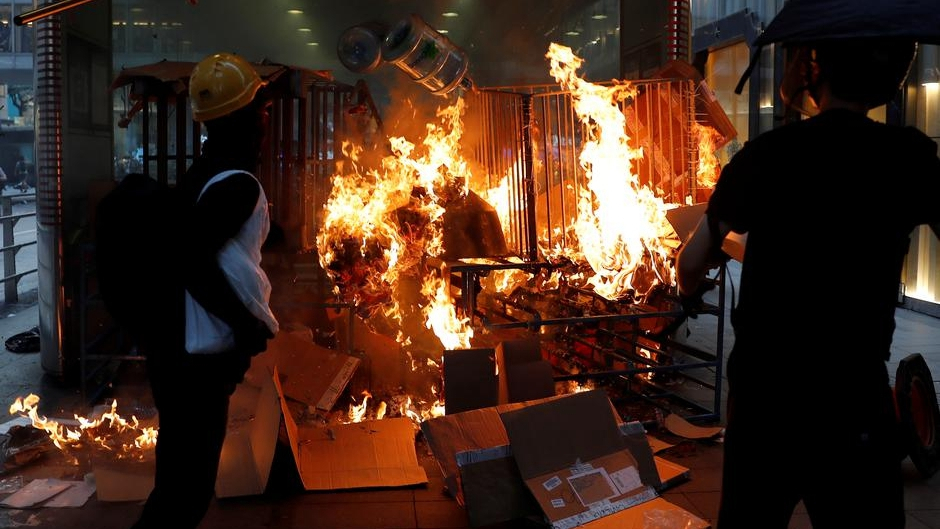

Editor's Note: Tom Fowdy is a British political and international relations analyst and a graduate of Durham and Oxford universities. He writes on topics pertaining to China, the DPRK, Britain and the United States. The article reflects the author's opinions and not necessarily the views of CGTN.
On Sunday, thousands of Hong Kong activists marched onto the U.S. Consulate General in Hong Kong in a desperate plea for President Donald Trump to "liberate" the territory. The demonstrators switched their chants from Cantonese to English, sang the American national anthem and waved American flags, asking the president to "save them."
In the midst of doing so, some of the participants also proceeded to deface the nearest metro station, setting up a huge fire at the entrance. As the march proceeded eastwards, infrastructure in the Wan Chai and Causeway Bay metro stations were also destroyed. Despite Chief Executive Carrie Lam withdrawing the proposed extradition bill, the activists have vowed to continue their push against the city's authorities until all of their demands are met.
The plea of some Hong Kong residents to demand that the United States "liberate" them is embarrassing and shameful. It does no justice to their cause and only polarizes them from their Chinese mainland compatriots, to which protesters believe they're superior.
This mindset is glorified by the mainstream media and given blanket support. It is also encouraged by American politicians. So it comes as no surprise that some of the demonstrators are engaging in these kinds of stunts in a bid to court Washington's attention. Believing they are "exceptional," some demonstrators cannot come to terms with the fact the city is rightfully a part of China, and are literally asking for foreign interference against their own city and country.
Why are some people in Hong Kong obsessed with the United States? First of all, some in Hong Kong continue to affirm that they are different and superior to their mainland compatriots. Due to Hong Kong's past as a British colony, the territory has developed its own sense of identity which has constantly asserted a moral and social superiority over the Chinese mainland.

Protesters set fire outside a police station in Hong Kong's Kowloon area, September 7, 2019. /CGTN Photo
Some in the city believe they have a divine right to be "different" and exclusive from the country that it is part of, despite the fact that its very creation was an act of foreign aggression. This has accumulated in an odd mindset, also perpetuated by the West, that the 1997 handover was somehow an injustice to local people. Thus at the heart of the movement lies the belief that Hong Kong should be distinct from China.
The protesters' pivot towards the United States has been encouraged by Western media and high profile U.S. politicians, including Nancy Pelosi, Marco Rubio, Mitch McConnell and many more.
The United States has continually demanded it has a stake in Hong Kong's outcome. This has been in public and also in private through a discreet coordination of low-level U.S. officials and organizations with individuals such as Joshua Wong. The protesters are led to believe that by grabbing America's attention even move, they can compel Congress and the U.S. administration to do something more.
What we saw on Sunday was in fact a shameless attention-seeking stunt. Activists are making a direct appeal to American exceptionalism in the light of the assumption that Washington is the world police who has the moral right to intervene in the affairs of other countries. What actions do they want? They hope that Congress and the presidency will pass a law that examines the city’s autonomy and in turn takes away special financial and market privileges if it does not. Effectively, they are hoping that Washington will say its autonomy has been "violated" and literally sanction their own city, something which of course would damage Hong Kong's financial center status.
But will this do any good for their cause? The administration is pursuing a lot of moves against China, but in this area it seems disinterested at best. Congressmen could try and push such a bill, but it is unlikely to get very far.
Of course, what it will do is alienate the city's activists even more from those in the Chinese mainland. Sunday's scenes on the streets of Hong Kong will stir up anger and discontent among mainlanders over what they would perceive as grotesque disrespect for their own country. In doing so, their actions are likely to further undermine any sympathy some might have had for Hong Kong protesters.
(If you want to contribute and have specific expertise, please contact us at opinions@cgtn.com.)

Copyright © 2018 CGTN. Beijing ICP prepared NO.16065310-3
Copyright © 2018 CGTN. Beijing ICP prepared NO.16065310-3